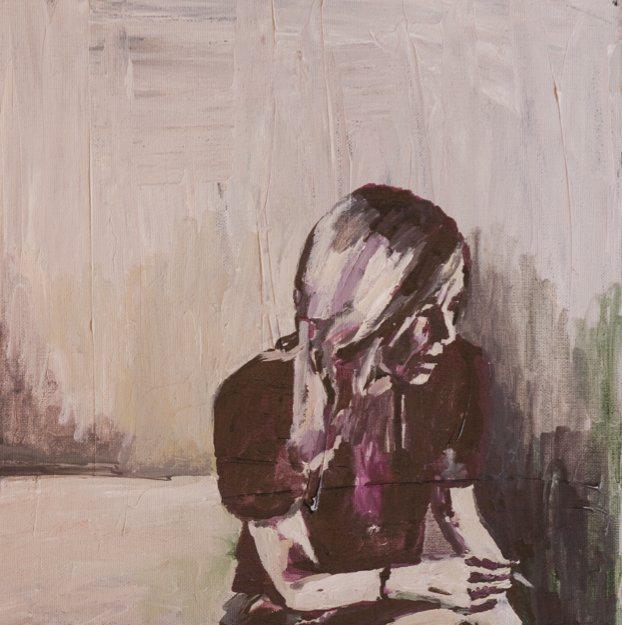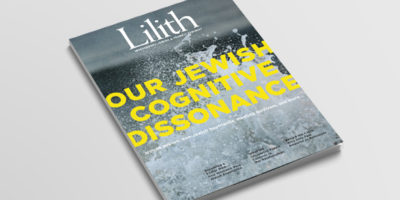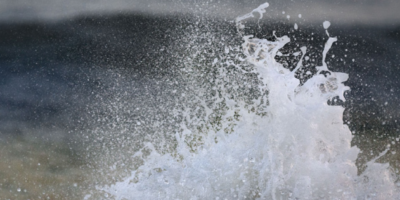
Smelling of Apples

Orly Maiberg, B-Side Painting Series, 2010.
Rachel is trying to figure out the perfect line break when she hears Carraway’s footsteps. Outside, the leaves are changing color, brassy oranges and sunflower yellows. She stares through the window at the roots of the trees and the dim blue glow of the emergency phone boxes that surround the quad. Carraway knocks on the door: two long, one short, meaning — in carefully calibrated roommate code — that she is not alone. Rachel doesn’t answer but swings her legs to the side of her chair, turning her head to see Carraway’s entrance.
She is, as usual, smiling widely, her hands entangled in her strawberry-blonde hair, smoothing her ponytail as two strangers, plus brilliant, serious Sergio, pile into the room. They are, yes, quite drunk. They exchange hellos, though Rachel doesn’t get out of her chair to shake hands. Sergio lives down the hallway from them. He loves Johnny Cash and imperialist history. The other boy, Noah, seems to be perpetually touching his chin as he thinks about what to contribute in a conversation. Lily is a bleached blonde with Russian cheekbones. Sergio and Noah are the glasses-wearers, though Sergio’s frames are stylish and confident, where Noah is mousey and fidgeting. Sergio is determined to remember which dictator he’d studied that had very tiny feet. It is, thankfully, the point in the semester where people had stopped comparing SAT scores as a way of
making conversation.
“I brought you the most delicious Triscuits,” Carraway exclaims. “And friends! I brought you new friends.” She stoops to kiss Rachel’s cheek as though Rachel were a delicate flower. “Some of them are wearing glasses,” Carraway whispers, as though the eyesight of these fellow freshmen was highly classified information.
“I love glasses,” Rachel says, also whispering, accepting the box of Triscuits.
“We’re on a mission,” Carraway gestures towards the chattering people who have settled onto Carraway’s bed. Beaming in Rachel’s direction, Carraway announces that they’ve come to capture her. “We have apples, and we’re going to see the moon!” Carraway says. “Wait. Sorry. How’s your enjambment jam?”
“Fruitless,” Rachel replies, sighing. “It’ll come to me. What kind of apples?”
“Red and green,” Carraway says. “They’re from an orchard. They’re everything!”
“Where are you going to see the moon?”
“The roof of Cushing,” Noah says, drifting into their conversation. He has beautiful eyes, Rachel realizes: green with specks of yellow clustered in the centers of his irises. He keeps fussing with the yarmulke on top of his head, light blue suede against dark brown curls.
“Will you leave your poem for an adventure?” Carraway asks.
“Can you climb up to the roof in Converse?” Rachel asks. She becomes very conscious of the fact that she is not wearing any makeup. But it was dark outside, she reasoned, and they are all drunk from the free red wine and cheese offered at the campus art gallery. Their teeth are shaded with a rosy glow. Rachel watches the group, absorbing the cadence of their conversation about the attractiveness of famous leaders and presidents (Lincoln: unequivocal yes; some debate about whether Stalin’s mustache counts in or against his favor), feeling the friendships forming and the not-aloneness filling her room, the not-aloneness that she can count on here. There were always footsteps outside the door; people washing their hands with bubblegum-pink soap in the bathroom across the hall. Each night, Rachel eventually fell asleep with the sound of Carraway’s breathing wrapping around her like a blanket of smoke.
“I don’t think there’s a climb. It’s just a secret window on the fourth floor,” Carraway says.
“If there is, we’ll carry you,” Noah says, a little brazenly, and Rachel blinks up at him in a surprised state of agreement.
On the way to Cushing — a corner of campus that’s basically Siberia, Lily complains, although nothing at Vassar is more than a twenty minute walk from where you are at any given time — Carraway swoops Rachel by the arm and asks, confidentially, “What do you think of the boy with the yarmulke? Don’t his eyes look like mold? Really seductive mold?”
“Such seductive mold,” Rachel agrees, laughing. “Do you like his yarmulke?”
“I want you to like him! But not just because of the yarmulke. Did you see how his lips just naturally are lipstick-colored? He’s a beautiful doll of a human being.”
“I’m not sure that you should tell him that, Car.”
“You’re right. You’re so right. Rachel is full of wisdom,” Carraway announces.
“They would’ve seen it,” Noah says. “Lily and Sergio were just talking about the West Wing.” Lily and Sergio, Rachel notices, are playing some kind of hand-holding game, their fall jackets woolenly rubbing against each other. Squirrels are skittering up tree branches, their little nails scraping bark as they reach into the sky.
“Okay, this is embarrassing, but I really think — okay. I think of God as a cross between Martin Sheen and John Goodman on the West Wing,” Lily says.
“Any other West Wing alums making an appearance in your spiritual version?” Sergio teases.
“The hulk of John Goodman and the face of Martin Sheen,” Lily clarifies to Rachel and Carraway. One of Rachel’s shoelaces has come undone, but she doesn’t want to stop the group; or, worse, be the only one to stop. Noah seems to be deliberately slowing down his steps, keeping pace with Carraway and Rachel. Lily leans into Sergio’s arm, her body looking slight against his rounded shoulders. Her jacket is blue with steely, round buttons down the back, military-style. How can she lean against anything in that coat? Rachel wonders. “Just a hulky President Bartlet.”
“I’ve never thought of God as a person,” Sergio says, his voice serious. “Visually. To me it’s more like a color.”
“Green?” Carraway guesses.
“Green?” Lily repeats. “The color of peas and trees?”
“Blue,” Sergio says, sounding a little hurt. “Periwinkle.”
“I don’t have a picture of God so much as a feeling evoked,” Noah says, also suddenly serious. Carraway is the only one still smiling with her big, wine-stained teeth; the boys considering God, Lily trying to look sexy with her feline face tilted to one side. Rachel looks briefly into Noah’s seductive-mold eyes. “It’s hard to put into words, I guess,” he says. He keeps staring at Sergio, trying to catch his eye.
Rachel re-evaluates the mindset of each person: they still seem drunk, loose-limbed as they curve the bend of the trail towards Cushing. “I know what you mean,” she says. “I remember memorizing the prayers when I was a kid, singing them all the time. Like, to my Beanie Babies before I put them to sleep at night, or washing my hair—whenever. I was maybe six. The words felt different, somehow. From regular words.”
“Different how?” Carraway asks.
“Like the difference between water and Seltzer,” Rachel says.
“Carbonated?” Carraway says. Rachel shrugs, matching Carraway’s smile. “Something like that,” she replies. They arrive at Cushing, Lily swiping her ID and leading the way up. Rachel is remembering the sound of her father coring Granny Smith apples for Rosh Hashanah; the delicate blue-and-white flowered tray with the lavender honey from the farmer’s market sitting in an inviting blob in the center. Rachel is remembering the long walk from the subway east, the pre-emptively placed Band-Aids on her easily blistered heels, dress shoes and thick opaque tights. Her dad, older, pronouncing some of the letters differently than Rachel had been taught, and she was embarrassed to hear him say Baruch ataw Adonai with a W. The sweat in drops running from Dad’s graying sideburns, the glittering band along his collar. He always wore a buttondown to temple, no matter what the temperature was outside. For some reason, in Rachel’s memories, it’s disproportionately often summer; humid and aching for the fans, the cushioned benches, the single red light hanging in front of the ark.
They ascend in single file up four flights of stairs, Carraway running to get there while Noah and Rachel take the longest. By the time they get to the third floor, Sergio and Lily have disappeared. “True love waits for no one,” Noah jokes, mildly panting, and Rachel laughs. How easy they have it, not needing to hide, she thinks, and then tries to let the thought sink to the very bottom of all of her thoughts, like a pebble thrown into a lake. She won’t let herself think it. She is loved, here.
Rachel follows Noah into the rickety, questionably safe fire stairway and then, wiggling nervously, climbs out of the window. Carraway hands her a congratulatory apple. The three of them sit cross-legged on the roof, staring into the velvety night. The moon is full, pearly and gleaming.
“We lost two of our compatriots,” Carraway says, sorrowfully.
“They’ll never see the moon,” Rachel says.
“Can you find any constellations?” Carraway asks them. Noah pushes his legs out, leaning on his elbows. He has tiny traces of an auburn beard. Rachel shakes her head, then looks into her lap. Sean pulling her by the hand out of the car, hurrying to find Jupiter in the massive, dark sky; Sean with his hand on the small of her back. Her fingers running along his cheek, the stubble of his chin that felt like it was scratching her skin into pencil-eraser shards. Just this one time, he’d paused for a beat longer than usual, staring back at her. He loves me, she thought, and it sunk down like bitemarks. Then he rubbed her bottom lip with his thumb before he kissed her, softly at first, then hard, harder, mashing his teeth into hers. After, he showed her the North Star, the Big Dipper, Cassiopeia. She knew he didn’t know what he was talking about and she didn’t care. That night: she held onto it for so long, remembering how things could be.
When they climb back through the window, Noah is the one to clasp Rachel’s hand. He does not comment on the clamminess, doesn’t make fun of her for fumbling as she descends. Carraway walks ahead, leaving her sister a detailed voicemail about the day’s events. Noah looks at Rachel, smelling of apples.
“What you said before, when we were talking about religion — carbonated? That was a nice way to describe it.”
She smiles, unsure what to say besides thank you, which falls out of her mouth so immediately that it feels insincere. “Do you go to services often?” Noah asks.
“I’m not Jewish enough,” Rachel says. “I mean, no. I wish I did.”
“You should come with me on Friday,” Noah says.
“What if I don’t remember how?” Rachel asks, and immediately berates herself for how stupid that sounds. “The words,” she explains, blushing. “I meant, what if I’ve forgotten the words?”
“We can sit next to the loud singers,” Noah says.
“Drown out the doubt?” Rachel says.
“Exactly.”
Rachel adjusts her skirt so that it comes right to her knees. She shifts her weight in the hard, plastic folding chair, keeping her legs still so that there is no chance of the prayerbook falling to the floor. The services are held in a strange, wooden barn-type auditorium that’s inexplicably attached to the Geology and Geography Building. There are only six or seven rows of chairs. Noah leads her right to the front, as promised. Four girls with severely straightened hair and Steve Madden flats are loudly singing the words to the candle lighting prayer. She smiles at Noah, looks at his eyes through his glasses. She stands with her fingers locked around the back of the folding chair in front of her, toes pointed towards the Torah.
And then it happens: she remembers. The sh’ma and the Amidah and the Bar’chu and all of it, everything, like ants swarming over a piece of cantaloupe; like dunking your head underwater for the first time in a swimming pool and watching the pieces of hair drift away from you, weightless, octopus tentacles of your own self. She knows the unmarked pauses in the Hebrew; she knows when to bend her knees. Her father. Her father sneaking her a sip of terrible, practically rancid wine from a silver cup; picking her up from Hebrew school on Sunday mornings and driving straight to KFC, don’t tell Mom, biting into cinnamon-brown super fried chicken breasts and the macaroni and cheese, unnaturally school-bus colored with the warm taste of oozy cheese and the little white plastic spork that came in the individually-wrapped packet with the rectangular napkin that was never enough napkin to actually aid in clean-up, and the purple chairs and crumbly buttery biscuits, two large sodas with Colonel Sanders’ face huge on the sides. Don’t tell Mom. He was the best cook, but he loved fast food and she’d say What kind of example are you setting? and Are you having a contest to see how bad your cholesterol can get? and Maybe I should just make you a steak and we can dip in butter-salt sauce. Her arms crossed. Rachel remembers him bike-riding, remembers him coming into her room after the bike rides with his face looming enormous and sweat-covered and her shrieking in disgusted delight as he kissed her cheeks before revealing a Peppermint Patty in one hand and a tiny toy in the other, usually a marble, sometimes a rubber ball that had come from a vending machine. Ray, you’re gonna be the most beautiful, perfect bat mitzvah girl there has ever been, he promised, but she was never any of those things. After he’d died, Rachel’s mother left the temple immediately. Cost-cutting, she’d explained, waving her manicured nails through the air to show the vast expanse of things they no longer needed in their lives.
When they get to the Mourner’s Kaddish, Rachel feels something in her chest like a latch unlatching; like a warmth trickling into her, blood rushing, but slowly, honey, dripping, the feeling of breathlessness, of her heart working in a way that is no longer heart-like but something else, unidentified, a jumble of her thoughts thinking themselves, and her skirt is not just her skirt but God’s skirt and her feet on God’s floor and Noah’s eyes, galaxy-like behind glass, and the sound of the words, the gutteralness next to the softness, consonants, vowels, right to left not left to right, we read together, please sit for silent prayer. Her thoughts thinking and unthinking themselves, sunrise, sunset, unlatching, how did she not always feel this, how has this not been the color of every moment, the texture and rhythm and light? Honey, congealing. L’shana tovah, they said to each other, apple slices sweet on their lips: a new year. I’m sorry, she wants to say; I’m sorry that I lost you, I’m sorry I’ve been gone, I’m sorry. She closes her eyes and the light makes her inside-eyes look a sweet, chocolatey brown and she sees an image of an egg yolk, sun-colored, sun-shaped, the metal sliver of a fork’s prong slicing into the egg yolk so that the sunshine spread against perfect, flawless white; and then the sound of Bjork’s voice, soaring, elastic, celestial in its rising and falling and Rachel is there, but a herself that feels somehow changed, a degree warmer, her lips are open and she is staring up at the sunlight coming in through the trees, her lips are open and someone is standing there, warm-fingered, holding her, inside of her, tingling and ubiquitous and in a way that seems like sex and almost not-sex and she is thinking I feel everything I feel everything I feel and Noah, tapping her shoulder gently, her eyes opening to see Noah, who says, “Do you want to be alone?” and realizing everyone’s gone, her feet are in exactly the same spot, the four straightened-hair girls are talking to the rabbi in one corner of the empty, barn-like room with the wood beams on the high ceiling and Noah has been waiting for her. And Rachel says, “Thank you,” and then Rachel says, “Yes.”
Amy Feltman has been published in The Rumpus, The Believer, The Sonder Review, The Millions, Two Serious Ladies, Gigantic Magazine, and The Toast. She works at Poets & Writers Magazine and is writing her first novel.



